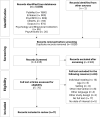Shared reading interventions to promote psychosocial well-being in older adults: a systematic review
- PMID: 40208190
- PMCID: PMC11983689
- DOI: 10.1093/heapro/daaf036
Shared reading interventions to promote psychosocial well-being in older adults: a systematic review
Abstract
Participatory interventions, such as art therapy and group activities, have been shown to promote healthy aging. However, the effectiveness of shared reading among older adults requires further evidence. The aim of this systematic review was to explore the impact and effectiveness of shared reading groups in slowing cognitive impairment, improving social interaction, promoting psychosocial well-being, and enhancing functional aspects among older adults living in the community. The selection criteria included studies published in English after 2000 focusing on individuals aged 60 and above and examining the benefits of shared reading. The studies also included participants with cognitive or psychiatric conditions who were independent. Seven databases were queried for this research. A total of 11 articles met the inclusion criteria. A descriptive analysis of the included studies revealed the tools used to measure the impact of interventions on outcomes and the key results obtained. Despite variability in methodology and outcomes, the results showed that group activities can improve self-rated health and reduce depressive symptoms in older adults. Interventions that include reading as a form of cognitive stimulation enhance communication skills, contribute to well-being, improve quality of life, reduce loneliness, and increase social engagement. Shared reading has positive effects on satisfaction with social relationships and community support. The findings suggested that shared reading groups represent a promising, non-pharmacological intervention for promoting psychological health, well-being, and social interaction. This review gathers existing literature and highlights the need for further studies to explore the effectiveness of this approach and to improve its implementation.
Keywords: cognitive functions; community-dwelling; older adults; psychosocial well-being; shared reading; social interactions.
© The Author(s) 2025. Published by Oxford University Press.
Conflict of interest statement
The author declares that no conflicts of interest exist in relation to the present article.
Figures
References
-
- Andersen TR. Regaining autonomy, competence, and relatedness: experiences from two shared reading groups for people diagnosed with cancer. Front Psychol 2022;13:1017166. https://doi.org/10.3389/fpsyg.2022.1017166 - DOI - PMC - PubMed
-
- Araujo de Carvalho I, Epping-Jordan J, Pot AM. et al. Organizing integrated health-care services to meet older people’s needs. Bull World Health Organ 2017;95:756–63. https://doi.org/10.2471/BLT.16.187617 - DOI - PMC - PubMed
-
- Billington J. Reading and Mental Health. Berlin: Springer Science + Business Media, 2020.
-
- Billington J, Davis P, Farrington G. et al. Qualitative methods: developing innovative qualitative approaches in research on reading and health. In: Billington J (ed.), Reading and Mental Health. London, UK: Palgrave Macmillan, 2019, 191–240.
-
- Bloom DE, Canning D, Lubet A.. Global population aging: facts, challenges, solutions & perspectives. Daedalus 2015;144:80–92. https://doi.org/10.1162/daed_a_00332 - DOI
Publication types
MeSH terms
Grants and funding
LinkOut - more resources
Full Text Sources
Miscellaneous


